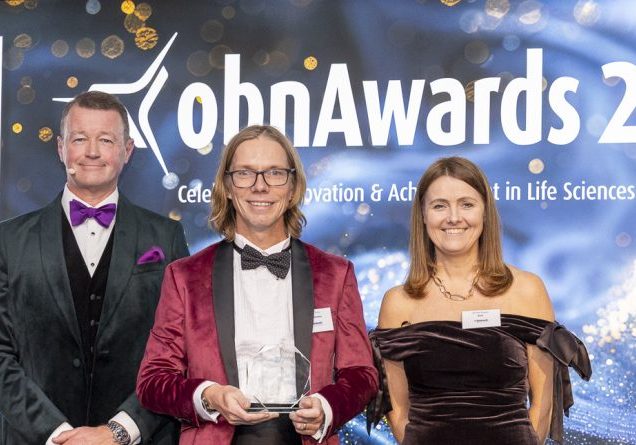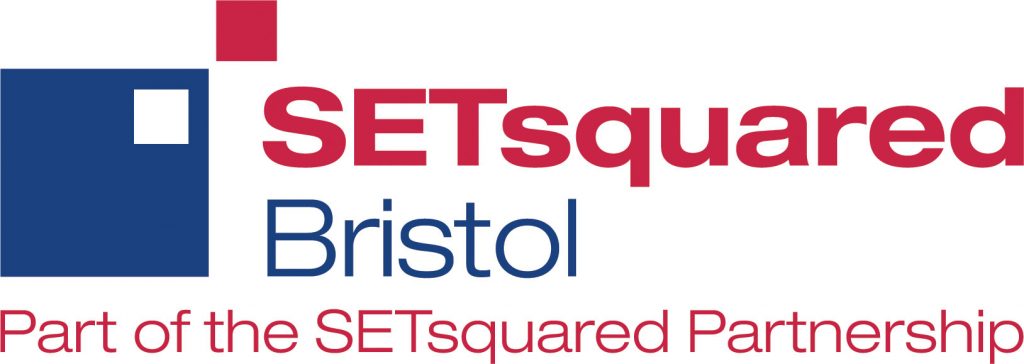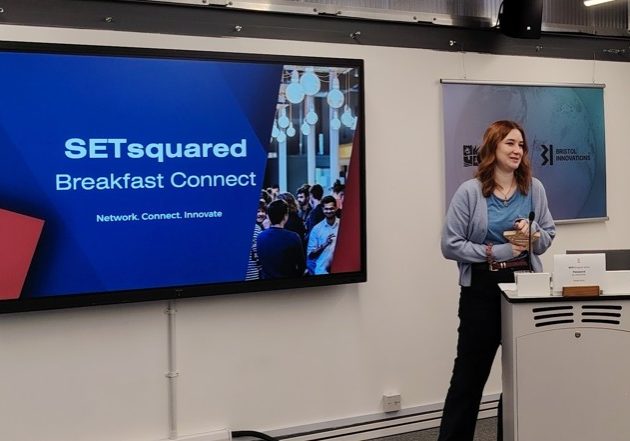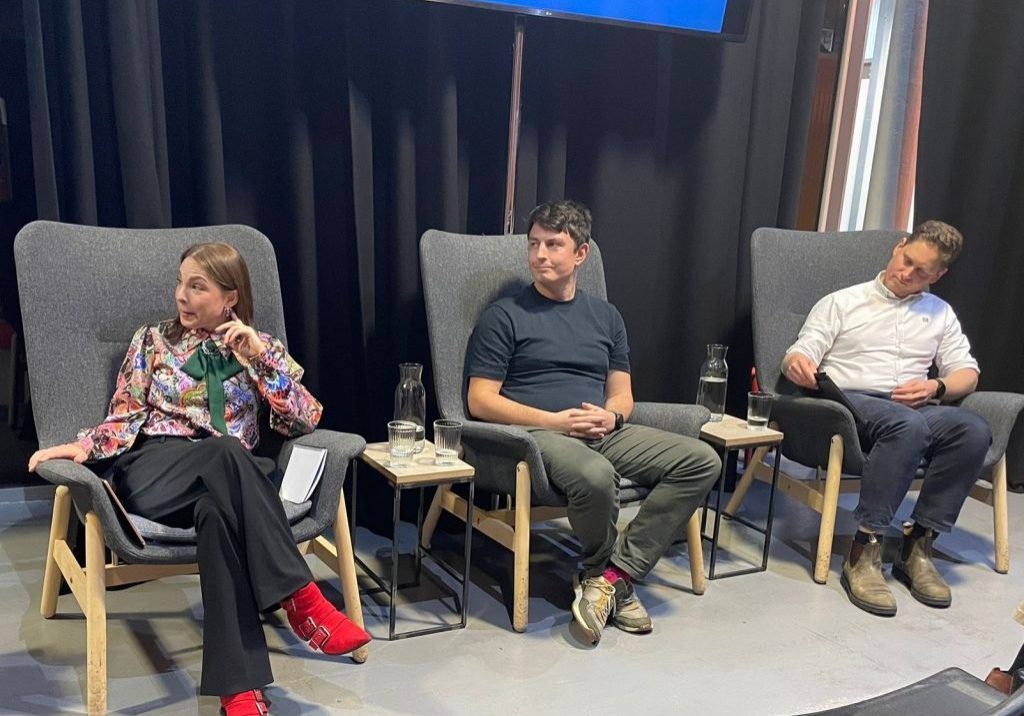GenomeKey case study: Saving lives through early diagnosis of sepsis
Posted by
SETsquared Bristol
To help our aspiring entrepreneurs and future SETsquared Bristol members, we showcase member and alumni case studies demonstrating the breadth of tech at SETsquared Bristol and what it takes to achieve success.
We had a chat with GenomeKey CEO, Michael Roberts…
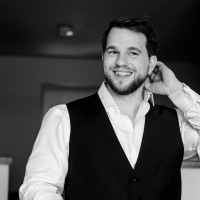 GenomeKey Facts
GenomeKey Facts
- Start date: August 2019
- Market sector: Medtech/diagnostics
- Location: Bristol
- Number of employees: 9 growing to 12 and beyond
- Amount of investment raised: £350K plus £8.4m in non-dilutive grant funding
- Company status: R&D phase
What does GenomeKey do?
We’re building technology that will save lives. GenomeKey is predominantly a team of scientists, and we’re set on making a difference to sepsis, one of the world’s most deadly diseases. When a bacteria infects your body and gets into your blood, it can cause an immune reaction which can kill as your body tries to fight off the bacteria grown within your blood. It’s such a severe disease that one in five deaths globally per year, including the pandemic, are due to sepsis. It kills more people than cancer every year, but can kill anybody of any age within hours; it really is a very severe condition.
The gold standard tests that are run today can take upwards of three to five days to return a result – for a disease that can kill within hours. This is where our technology can make a difference. The other problem is the rise of antimicrobial resistance; a bacteria’s ability to evolve resistances to the only weapon that we have in this fight, which is antibiotics. It’s another large crisis often called ‘the other global warming’, that the entire population of planet Earth will face within decades, because antibiotics have been arguably one of the tools which has extended the life span of human beings more than anything else over the last 50-100 years. And that one tool is becoming less and less effective as we go forwards. When we try to fight sepsis in those crucial hours, where you have the option to save somebody’s life, it’s becoming more common that the antibiotics used are more frequently ineffective. That’s a huge problem.
GenomeKey is developing new technology to try to overcome these challenges. We’re doing it by providing answers to clinicians faster so they can put the patient on the right life-saving antibiotics as soon as possible, and ultimately if we can do that, we’ll save lives, save the NHS a huge amount of money, and of course save our antibiotics for the future as well.
The death toll of sepsis is huge, but to add to that is the financial impact it has on the NHS, around £2 billion a year impact in terms of direct treatments costs, and there’s around a £12 billion knock on effect to the wider UK economy each year as well. Even a small dent will save a huge amount of money to the economy and a large number of lives. Of course, we’re not aiming to make a small dent, we’re aiming to make a huge change on the impact of sepsis.
How does GenomeKey’s technology take the guesswork out of treatment decisions in the first critical hours of illness?
Broad-spectrum antibiotics are currently used, casting as wide a net as possible with the greatest chance of using the right antibiotics to kill off the bacteria. But the reason we currently have to use broad techniques like this is due to diagnostic uncertainty. GenomeKey’s technology will reduce that uncertainty, to be able to tell which specific antibiotic and how much of it will be needed to treat specific species of bacteria.
The current use of culturing, which is extracting bacteria from a person’s blood to be tested, is not a good solution due to the length of time it takes to diagnose. GenomeKey is bringing together two transformative technologies: machine learning and whole genomic sequencing (DNA sequencing). Both of these technologies are making revolutions in their own separate ways, but we’re bringing them together specifically for this application to make a huge leap and a bound in how we diagnose and treat sepsis. This means clinicians can take a normal blood draw from the patient, but rather than going to the lab to grow the bacteria, it goes into our system through a cartridge-fed machine, to sequence the full DNA of the bacteria within the patient’s blood to interpret from that DNA code every single answer that you clinically want about the bacteria. So, we could tell you which antibiotics will be effective, the growth rate, the species, what toxicity genes are present, which all come together to help the clinician understand what the patient outcome is going to be. There’s several advantages to this, including not needing living bacteria.
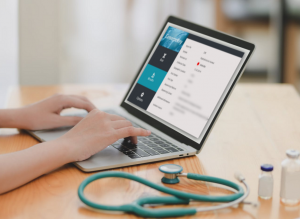 Can you tell me a bit about your background and what led you to start the business?
Can you tell me a bit about your background and what led you to start the business?
I grew up with a number of strong entrepreneurial role models, so it was always something that appeared to be a possibility for me. My mother built one of the top three retail companies in her market sector in the UK organically and from scratch. Also, two of my closest friends growing up went on to build successful tech businesses. Having role models like these really helped.
For me, my plan A growing up was always to be a scientist, not an entrepreneur, but my ambition was always set on inventing something that could make a difference to the world. At some point I came to realise that it’s not only scientists that make the difference, it’s entrepreneurs, as they are the ones who put science into people’s hands to make that difference. So, I jumped at the opportunity to do an MBA in Edinburgh alongside my PHD.
GenomeKey isn’t my first startup, I previously had a startup in the oil and gas market. We built a data transformation tool which enabled people who were exploring for new hydrocarbons to take historical data, clean it up and convert it into a format which is more compatible with the modern ways of doing exploration. Two of the other founders of GenomeKey and I spent a year and a half building the product and made a profit from it. So, then we took the bad entrepreneurial move of canning that profitable business for GenomeKey – which at the time was only an idea! But the reason we made that move is because the mission of GenomeKey is so much more important to us. It was worth the risk and one of the better decisions I’ve made in my life.
Why is it important for Artificial Intelligence to be open, explainable and informative in the decisions it makes?
From Genomekey’s perspective, it’s not good enough to make the right decisions, people have to believe that the decisions are right, that’s absolutely crucial to the adoption of technology. That all boils down to trust at the end of the day. If a doctor tells you that there’s a 99% certainty that a certain medicine will work, that’s a very trustworthy decision, because you know the doctor has been through extensive medical training, that the decision is founded upon science, and that the doctor has a certain level of liability for the decisions and advice that they give you. But that doesn’t extend to an algorithm.
Algorithms can be trained on data that can be flawed, and can be confidently wrong in its answer, and crucially there’s no liability for the algorithm, it doesn’t matter or care if it’s wrong. Naturally people distrust an algorithm, not just more than they distrust a doctor, but in a very different way. It’s absolutely right to insist that an algorithm should explain how it arrived at its answer, such that it proves it’s the right answer, not just that it claims to be. So, at GenomeKey, we’ve built this into our systems from the very ground up.
We knew that our technology would have to be open and explainable to be adopted in the medtech world. Our algorithms can be interrogated when they provide an answer, even down to the individual mutations of genes, and how much each genome contributes to the answer that it’s given. It can say how certain it is about the response given and this is the evidence that it’s founded the decision upon. Essentially to provide a strong enough answer for people to trust. This was one of the key validation steps in our algorithm when we were developing it.
How has SETsquared Bristol helped your business?
SETsquared Bristol’s business support programme and community is very beneficial. We targeted SETsquared as we knew we wanted to be part of a larger entrepreneurial community, and we knew there would be many benefits to that. We didn’t want to be in isolation as a company. This was pre-lockdown and it became even more apparent during lockdown that we needed that wider community.
We applied to SETsquared as we wanted to avoid the mistakes that other companies had made. We wanted to talk to other companies that are similar to us to learn how to overcome challenges and the pitfalls to avoid. We wanted to understand the mindset that it takes to build the company successfully, as we’d never built one like GenomeKey before.
The other reason we approached SETsquared is because of the investor community; we quickly realised that the companies that get into SETsquared are held in very high regard and investors take note of that. Just being a SETsquared member is helpful in opening those doors to engage with investors. That was absolutely successful for us, as we met our investors through SETsquared.
What investment have you raised?
We’ve raised a mixture of angel, VC and grant funding which totals nearly £9 million, all of which we’re pretty much focusing on R&D. It’s a decent amount of money which will enable us to take a step back and challenge the fundamental science problem that we’re trying to overcome. We’re not scrambling to build a diagnostic with today’s science, we’re able to take a step back, have a look at the problem and develop new science to build the next generation of diagnostics.
Why is there a thriving healthtech cluster in Bristol?
We had the option of founding the company anywhere and we chose Bristol as we realised there was a thriving entrepreneurial community in Bristol and of course Bristol has an engineering pedigree as well. Essentially what we’re doing is engineering at the molecular level, rather than at the bricks and mortar level. But it is with the same mindset, so we wanted to be within that community that Bristol offered.
Of course, there’ve been quite a few large medtech exits in Bristol as well which really helps, and a lot of that money is being re-invested back into Bristol – I’m giving a nod to the Science Creates team here from the Ziylo exit. Through Unit DX and the new accelerator, they are reinvesting back into Bristol and nurturing the right community.
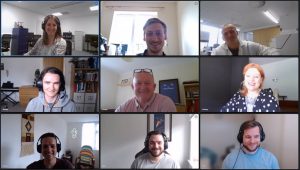 What are you most proud of?
What are you most proud of?
That’s an easy one; absolutely my team. In a very short time period we assembled an extremely competent and highly motivated team who are a pleasure to work with. It genuinely brings me a huge amount of joy every Friday when we sit down as a team for what we call ‘A Pint of Science’, to talk about any science, it doesn’t have to be related to what GenomeKey is doing. The whole team have stuck together through the ups and downs, it’s been a bit of a rocky journey as every startup is, and we’ve never wavered. We’re set on our mission of making an impact in sepsis.
We built the company predominantly with scientists, which started with four Co-founders, myself, Dan, Chris and Ben, we’re all engineers and scientists by trade. I personally believe that scientists can make some of the best business people. Business is a numbers game and is an evidence and empirically driven endeavour, as opposed to sharp suits!
If you could do one thing differently whilst building the business, what would that be?
Steve Jobs once said, “You can’t connect the dots looking forward; you can only connect them looking backwards”. That’s very much how it feels with GenomeKey as well. Looking back at the path that we took to get to where we are, we always did what we thought was best at the time. That path has led us to where we are now, and we are in exactly the place that we want to be. We have a great team, we’re doing mind boggling science, and we’re doing it for one of the most important causes I can imagine. There have been ups and downs on the journey of course, but the destination is exactly where we want to be so I can’t really say I would change anything about the path we took to get there!
If you were to give advice to another startup, what would that be?
I would say, don’t be afraid to take the jump, it’s very difficult to make the decision to give up a salaried job to take on something which will cost you your life savings, has a very low chance of success and has a huge amount of uncertainty. But there is no choice other than to do that if you want to try and create a new company. If you don’t try you never know.
There is never a manual that says how to create a company, so it will be difficult, but there’s no benefit to putting it off. I took the jump, it was a very hard thing to do, it’s cost me a huge amount of money, but it was absolutely the right choice for me, and I’d do it again, probably even sooner with hindsight.
What are the next steps for GenomeKey?
The next two years will be predominantly an R&D focus. Genomic sequencing is going through a massive revolution. The ‘Human Genome Project’ back in the 90s, where one human being’s whole genome was sequenced, cost around $2 billion, just one person’s DNA! Nowadays, I could sequence your DNA for less than £1K, and it would take around 24 hours to do that. That is a greater than exponential change in that time period.
The other technology that really excites us is the ability to edit DNA. On the one hand, we have the ability to sequence it, on the other hand, the ability to edit it, and the bit that’s missing to bridge that gap is the ability to interpret DNA, because you can’t edit it if you don’t know what you’re changing. This is where GenomeKey sits; developing algorithms that can interpret and manipulate DNA to an unprecedented accuracy and capability.
However, because we’re a startup, we’re laser focused on our one application right now, which is to build the diagnostic to make an impact on sepsis. But beyond that there’s a huge amount of potential. In the future I would love to start applying our algorithms to uncovering and interpreting the genetic origins of human disease for example.
Discover more of the companies SETsquared incubate here and sign up to the monthly SETsquared newsletter to keep up with news, events, opportunities and more.
Recent News, Blogs and Stories
